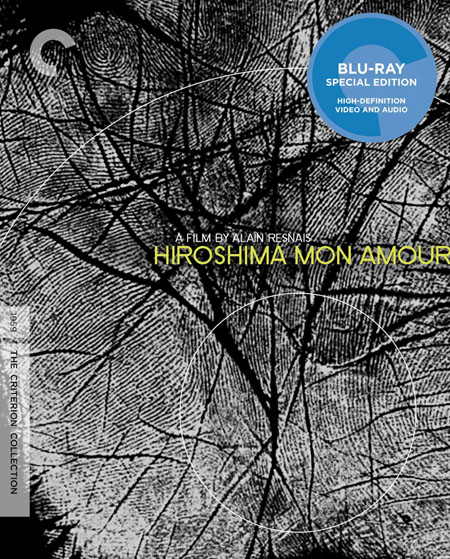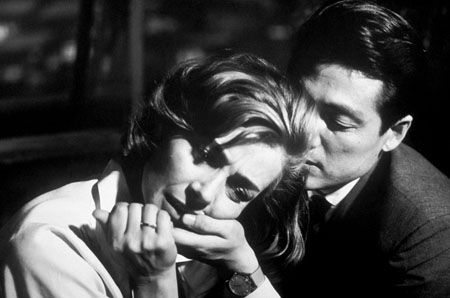
“HE SAID/SHE
SAID—REFLECTIONS ON LOVE, UNRELIABLE MEMORIES, AND THE ATOMIC BOMBâ€
By Raymond Benson
Director
Alain Resnais achieved worldwide acclaim with his documentary short, Night and Fog (1955), which revealed to
the world the true horrors of what went on in the Nazi concentration camps. For
his first feature film, Resnais turned to fiction; and yet, he maintained a
somewhat documentary approach in showing the world the true horrors of what
occurred in Hiroshima, Japan when the first atomic bomb was dropped. Beyond
that, Hiroshima mon amour (“Hiroshima,
My Loveâ€) is an art film that not only signaled the beginning of the French New
Wave (although many film historians do not count it as an example of that
movement), it also established Resnais’ singular, enigmatic and ambiguous style
as an auteur. The director would go on to make even more thematically-mysterious
pictures (namely Last Year at Marienbad)
and become something of a French equivalent of Terrence Malick. Sort of.
Hiroshima mon amour
is
quite accessible, though, and it will surely stay with and haunt the viewer
long after watching the film. Primarily it’s a love story between a French
woman (Emmanuelle Riva, who returned to the limelight in 2012 with her
Oscar-nominated leading role in Amour)
and a Japanese man (Eiji Okada). The man is married, but his wife is away. The
woman is “married†to the ghost of her first love, a German officer who died
just before France was liberated in World War II. For that forbidden love, she
was ostracized and punished by the population of her small town, complete with
head shaving and shaming. This so psychologically damaged her that now, in the
present (1959), she is willing to embark on a two-night stand with a stranger.
The leading characters’ names are never mentioned, although they end up calling
each other by the city from which they hail—“Hiroshima,†for the man, and “Neversâ€
(her home town in France), for the woman.
The
picture follows the short romance over the course of two nights and a day
in-between, juxtaposed with numerous flashbacks of the woman’s experience
during the war. Overlaid on all of this is visceral footage of the atomic bomb’s
aftermath in the city of Hiroshima, where the story takes place. Do the
characters tell the truth to each other? Are their memories real or imagined? She
might state something as fact, but then the man will say it isn’t true. And
vice versa. A facetious way to describe it the film is that it’s “He Said/She
Said in a Dreamscape.â€
Perhaps
this doesn’t sound like a good time at the cinema, but don’t be fooled—Hiroshima mon amour is a powerful,
deeply moving piece of filmmaking that still resonates today. It explores how
we remember traumatic experiences in our lives, what we censor, and what we
embellish. The black and white cinematography, by Michio Takahashi and Sacha
Vierney (the picture was a French-Japanese co-production), is stunningly
gorgeous. The performances, especially by Riva, are outstanding. The musical
score, by Georges Delerue and Giovanni Fusco, alternates between playful and
melodic accessibility to avant-garde Stravinsky-like dissonance. And the direction,
well, let’s just say that Alain Resnais went on to become one of the most
revered French filmmakers, and Hiroshima
mon amour could very well be his masterpiece.

The
Criterion Collection released the film on DVD over a decade ago and they have now
seen fit to provide us with a new 4K digital restoration on Blu-ray with an
uncompressed monaural soundtrack. Criterion will always be the Cadillac of
Blu-ray restoration of old classics, and their work on Hiroshima is outstanding. All of the extras from the previous DVD
release are ported over, and there are some new supplements as well, including:
a program on the film’s restoration; a new interview with film scholar Francois
Thomas, author of a book on Resnais; and a new interview with music scholar Tim
Page about the film’s score. The previous supplements include an excellent audio commentary by film
historian Peter Cowie; interviews with Resnais from 1961 and 1980; interviews
with Emmanuelle Riva from 1959 and 2003; and an essay by critic Ken Jones and
excerpts from a 1959 Cahiers du cinema discussion
about the film, both of which appear in the booklet.
Quite
simply, Hiroshima mon amour is a milestone
of important international cinema. You owe it to yourself to see it. Maybe you
already have. Do you really remember?
CLICK HERE TO ORDER FROM AMAZON